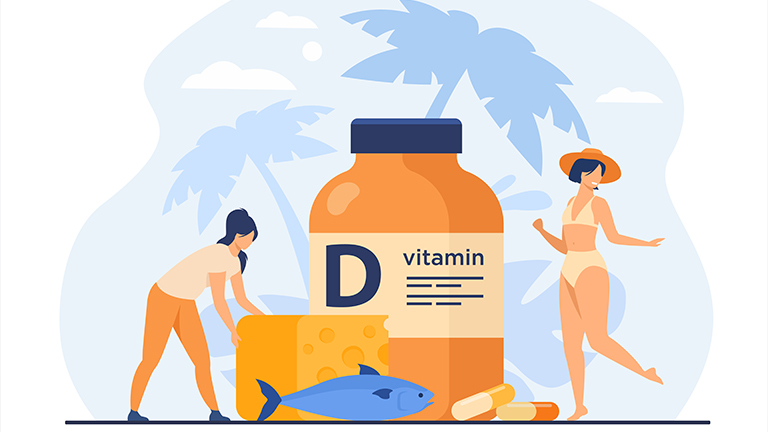Vitamin D Benefits: Vitamin D, often referred to as the “sunshine vitamin,” is essential for maintaining overall health and well-being. It is unique because the body can produce it naturally when the skin is exposed to sunlight. Beyond its role in supporting bone health, vitamin D plays a critical part in immune function, mood regulation, and the prevention of chronic diseases. Unfortunately, vitamin D deficiency is common in many parts of the world, especially in regions with limited sunlight during winter months like the USA, UK, and Canada.
Top Health Benefits of Vitamin D
Vitamin D is far more than just a nutrient—it is a powerful hormone that influences several systems in the body. Let’s explore its top benefits.
Stronger Bones and Teeth
One of the most well-known vitamin D health benefits is its ability to help the body absorb calcium, which is essential for building and maintaining strong bones and teeth. Without adequate vitamin D, bones can become thin, brittle, or misshapen, leading to conditions like rickets in children and osteoporosis in adults.
Enhanced Immune System Support
Vitamin D plays a key role in activating immune cells that protect against harmful pathogens. Studies have shown that vitamin D and immune system function are closely linked, with sufficient levels helping reduce the risk of infections, colds, and even certain autoimmune diseases.
Improved Mood and Mental Health
Low vitamin D levels have been linked to depression and Seasonal Affective Disorder (SAD), particularly during winter months when sunlight exposure is limited. Research suggests that vitamin D supports serotonin production, which can boost mood and reduce anxiety. This is why vitamin D for mental health is often recommended as part of a holistic wellness plan.
Heart Health and Blood Pressure Regulation
Emerging evidence shows that vitamin D may help lower the risk of cardiovascular disease by supporting healthy blood vessels and regulating blood pressure. Adequate vitamin D and heart health levels are associated with reduced inflammation and improved heart function.
How Vitamin D Works in the Body
Vitamin D is a fat-soluble vitamin that functions like a hormone. Once absorbed from sunlight, food, or supplements, it is converted in the liver and kidneys into its active form, calcitriol. This active form helps regulate calcium and phosphorus levels in the blood, supporting bone health, nerve function, and muscle contraction.
Natural Sources of Vitamin D
Sunlight Exposure
Sunlight is the most natural way to get vitamin D. When ultraviolet B (UVB) rays hit the skin, the body produces vitamin D naturally. Experts recommend about 10–30 minutes of midday sun exposure several times a week, depending on skin tone and geographic location. However, in places like Canada and the northern UK, winter sunlight may not provide enough UVB rays for adequate vitamin D production.
Vitamin D-Rich Foods
While sunlight is the primary source, you can also boost your levels through diet. Best foods high in vitamin D include:
- Fatty fish (salmon, mackerel, sardines)
- Fortified dairy products and plant-based milk
- Egg yolks
- Beef liver
- Fortified cereals
Vitamin D Deficiency: Signs and Risks
Vitamin D deficiency symptoms can be subtle but may include:
- Fatigue and low energy
- Bone pain and muscle weakness
- Frequent illnesses or infections
- Mood changes and depression
- Slow wound healing
Long-term deficiency can lead to serious health issues, including osteoporosis, heart problems, and increased risk of autoimmune diseases.
Vitamin D Supplementation: Who Needs It?
People most at risk of deficiency include:
- Older adults (reduced skin synthesis)
- People with darker skin tones (less UVB absorption)
- Individuals who spend little time outdoors
- Those living in northern climates
- People with digestive disorders affecting nutrient absorption
Vitamin D supplements benefits include convenient dosage control and guaranteed intake regardless of sunlight availability.
Vitamin D and Specific Health Conditions
Osteoporosis Prevention
Adequate vitamin D and calcium absorption are vital for preventing osteoporosis, a condition that weakens bones and increases fracture risk, especially in postmenopausal women.
Depression and Seasonal Affective Disorder (SAD)
Supplementation during winter months can help reduce symptoms of depression, particularly for those living in low-sunlight regions.
Autoimmune Disease Support
Vitamin D may help regulate immune function and reduce inflammation, potentially lowering the risk or severity of autoimmune conditions such as multiple sclerosis, rheumatoid arthritis, and type 1 diabetes.
Recommended Daily Intake of Vitamin D
The recommended daily dosage of vitamin D varies by age, health status, and location:
- Adults (19–70 years): 600 IU (15 mcg)
- Adults over 70: 800 IU (20 mcg)
- Children and teens: 600 IU (15 mcg)
- Infants: 400 IU (10 mcg)
In cases of deficiency, healthcare providers may recommend higher doses temporarily.
Myths and Facts About Vitamin D
- Myth: You can get enough vitamin D from sunlight year-round.
Fact: In many regions, especially during winter, sunlight is insufficient. - Myth: More vitamin D is always better.
Fact: Excessive vitamin D can cause toxicity, leading to high calcium levels and kidney damage. - Myth: Only older adults need vitamin D supplements.
Fact: People of all ages can be deficient, depending on lifestyle and location.
Conclusion: Optimizing Your Vitamin D Levels
Vitamin D is a cornerstone of good health, affecting bones, immunity, mood, and more. By combining safe sunlight exposure, vitamin D-rich foods, and supplements when necessary, you can maintain optimal levels and reduce the risk of deficiency-related health problems. Whether you live in sunny California or the cloudy UK, taking steps to ensure adequate vitamin D intake is one of the best investments you can make for your long-term health.


